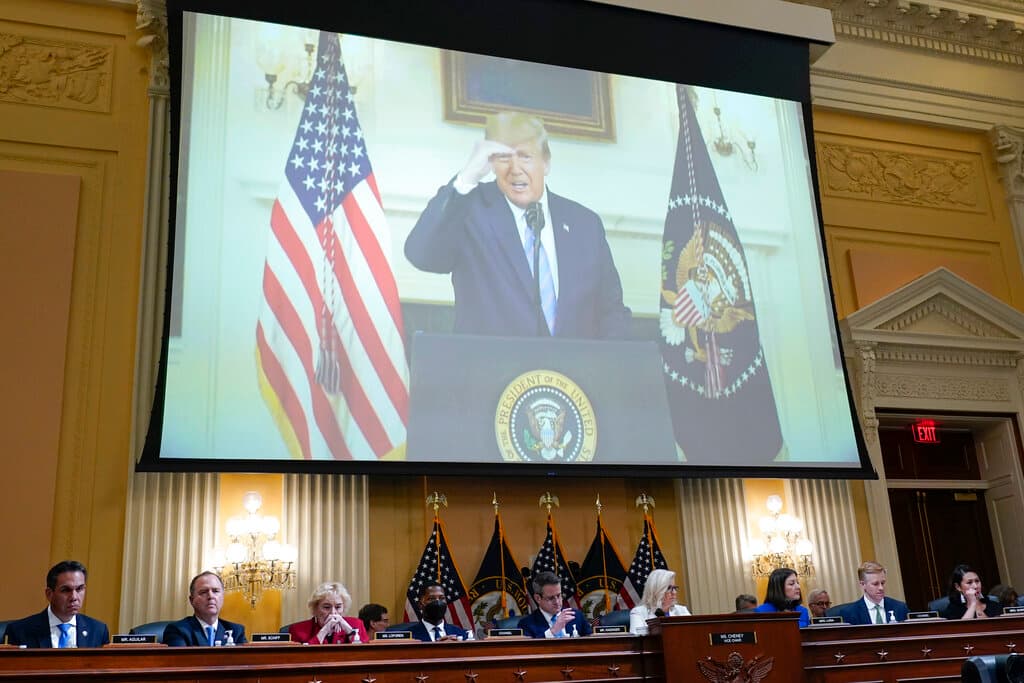Lame Duck Democrats in a Rush To Disqualify Trump From Presidency
With various other subpoenas on the agenda, the 117th Congress charts a noisy exit from the majority.

It’s last licks for the 117th United States Congress, and the Democrats now running the show are eager to get in their swings at President Trump and attempt to nip his 2024 candidacy for president in the bud. On their way out, Democrats are eager to show that even lame ducks can flash sharp teeth.
A letter sent by Representative David Cicilline to House Democrats previewing a bill to disqualify Mr. Trump from office underscored how previous efforts to bar candidates for lower offices on the basis of Section 3 of the 14th Amendment were preludes for the presidential push.
That clause blocks someone seeking office from serving if he or she “engaged in insurrection.” Mr. Cicilline promulgated the letter the night Mr. Trump announced that he would seek a return to the White House. The representative asked for co-sponsors, in a hurry; a Thursday deadline signals that Mr. Cicilline wants to move quickly.
That haste is attributable to simple math. The Disqualification Clause requires only a majority vote in each chamber, though it would inevitably have to contend with a filibuster in the Senate. At least on paper, Democrats possess those bare majorities at the moment; they will melt away in January.
Even if Mr. Cicilline manages to rustle up Democratic support, the bill could be honored more in the breach than in the observance. As the Congressional Research Service notes, “it is unclear whether Section 3 is self-executing,” meaning a separate law would be required to give it force. This would be uncharted constitutional waters.
Legal worthies are increasingly mentioning the common law writ of quo warranto, which translates as “by what right,” which enables a court to hear challenges to a person’s right to hold public office as well as remove an unqualified individual from office. This writ has been incorporated into the Code of the District of Columbia, providing lawmakers with a tool close at hand.
Quo warranto’s signature usage was by King Charles II against the Corporation of London, in 1683. The King’s Bench handed the Crown the charters and franchises of the City of London. That ruling was reversed after the Glorious Revolution by “An Act for Reversing the Judgment in a Quo Warranto against the City of London and for Restoreing the City of London to its antient Rights and Privileges.”
A recent report out of a legal think tank called Just Security argues that the January 6 committee, a creature of the expiring Democratic majority, could aid this process by making “factual and legal findings that it has uncovered disqualifying conduct, and that Section 3 can and should be enforced through existing processes.”
Only one court has ruled that the events of January 6, 2021, constituted an insurrection — a state district judge in New Mexico, who booted a county commissioner, Couy Griffin, from office for facilitating the attack and joining in its execution. Griffin has, unlike Mr. Trump, been convicted for trespassing at the Capitol. That case was decided on the basis of New Mexico’s quo warranto statute.
Whether disqualification is possible without a prior conviction is another zone of uncertainty. The lone charge in Mr. Trump’s second impeachment trial, “incitement to insurrection,” yielded an acquittal. Mr. Cicilline argues that “Donald Trump engaged in insurrection when he helped to plan and encouraged” the riot.
In addition to lending a hand to the disqualification effort, the January 6 committee must contemplate its own push against Mr. Trump. In its last hearing, the nine-member body voted to subpoena Mr. Trump. In response, the former president has sued, arguing that the summons is “invalid” because it does not further a legislative purpose and is overly broad.
While the committee released a statement accusing Mr. Trump of “hiding” from its investigation and “refusing to do what more than a thousand other witnesses have done,” the chairman, Representative Bennie Thompson, admitted that the suit “kinda puts everything on hold right now.” He mused that the committee would “take a position at some point.”
Despite Mr. Thompson’s leisurely prognostication, on this front too Democrats are running out of time. The entire House would need to vote to hold Mr. Trump in contempt, followed by a decision from the Department of Justice to prosecute. It is unlikely such a vote would be held under the prospective next speaker of the House, Representative Kevin McCarthy.

